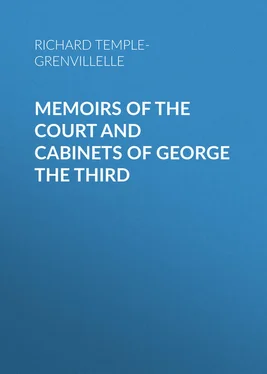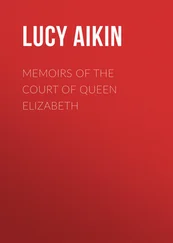Richard Buckingham and Chandos - Memoirs of the Court and Cabinets of George the Third
Здесь есть возможность читать онлайн «Richard Buckingham and Chandos - Memoirs of the Court and Cabinets of George the Third» — ознакомительный отрывок электронной книги совершенно бесплатно, а после прочтения отрывка купить полную версию. В некоторых случаях можно слушать аудио, скачать через торрент в формате fb2 и присутствует краткое содержание. Жанр: foreign_antique, foreign_prose, на английском языке. Описание произведения, (предисловие) а так же отзывы посетителей доступны на портале библиотеки ЛибКат.
- Название:Memoirs of the Court and Cabinets of George the Third
- Автор:
- Жанр:
- Год:неизвестен
- ISBN:нет данных
- Рейтинг книги:5 / 5. Голосов: 1
-
Избранное:Добавить в избранное
- Отзывы:
-
Ваша оценка:
- 100
- 1
- 2
- 3
- 4
- 5
Memoirs of the Court and Cabinets of George the Third: краткое содержание, описание и аннотация
Предлагаем к чтению аннотацию, описание, краткое содержание или предисловие (зависит от того, что написал сам автор книги «Memoirs of the Court and Cabinets of George the Third»). Если вы не нашли необходимую информацию о книге — напишите в комментариях, мы постараемся отыскать её.
Memoirs of the Court and Cabinets of George the Third — читать онлайн ознакомительный отрывок
Ниже представлен текст книги, разбитый по страницам. Система сохранения места последней прочитанной страницы, позволяет с удобством читать онлайн бесплатно книгу «Memoirs of the Court and Cabinets of George the Third», без необходимости каждый раз заново искать на чём Вы остановились. Поставьте закладку, и сможете в любой момент перейти на страницу, на которой закончили чтение.
Интервал:
Закладка:
I dined at three, at a coffee-house, with my cousin, old William Lawrence, who called on me; Smith, member for Sudbury, leader of the Dissenters, joined us on the walk, and was of our dinner party. Lawrence said he wished a compromise, a limited regency for a year , and then to take up the business anew, if the King was not recovered, on the other ground, and he is a leading country gentleman of their party, Smith is in an unqualified manner with us; and Thornton, whose place in the House is next to me, being equally staunch, I augur that we have all the Dissenters' interest with us. Indeed, generally speaking, the House looks better for us than I expected, and I doubt not our majority, yet thinking it will not be great; indeed the House is not nearly so full as it was on the late question, and the apprehensions I set out with of temporizers and shirkers, as we called them at Eton, seem confirmed.
Edmund Burke arose a little after four, and is speaking yet. He has been wilder than ever, and laid himself and party open more than ever speaker did. He is Folly personified, but shaking his cap and bells under the laurel of genius; among other things, he said Mr. Pitt's proposals could not be adopted, as gentlemen, as cavaliers : the word will not be forgot.
Fox is present, but looks very ill. Pitt looks recovered. Your brother in high glee at Burke. Burke stated the Chancellor to be like to the God Priapus, and Pitt the carpenter. He run his idea to a charming extravagance, and finished by declaring that "he could not be a votary to Priapus, the false God! vid. Horace, &c."
The question is an amendment of Dempster's, to follow; the Lords and Commons, &c., determine "to address the Prince of Wales, to take on him the Regency, &c."
Adieu, my dear Lord. Your Marchioness in health, and a boy, and yourself in all good that Providence can dispense, is the prayer of your most faithfully affectionate and devoted friend, &c.
W. Young.
Six o'clock.
SIR WILLIAM YOUNG TO THE MARQUIS OF BUCKINGHAM.
Tuesday, Dec. 23rd, 1788.
My dear Lord,
Never did any debate of nice discussion go off better in our eye than that of last night: never was I more agreeably surprised than by the result – having gained nine on our former majority. The House was thinner by forty at twelve at night, than the debate before at three in the morning. The shirkers I alluded to may now come in, and we may augur our future divisions to be yet stronger and more decisive: our rats having all shown their tails on last night's motion to address the Prince.
Sir John Aubrey, rat-major, receiving his emoluments of the Treasury for five years, and declaring himself unconnected with any, afforded a subject of general laugh. Master Popham, Sir Samuel Hurmery, James Macpherson, W.G. Hamilton, &c., &c., followed the illustrious Aubrey. Fox, after Pitt's reply, and his own rejoinder, paired off with Stevens of the Admiralty. The Marquis of Lansdowne's friends, Barré, &c., were with us. Masham, voting for the Address, declared himself not precluded thereby from voting for limitations. Drake, on the same head, not to preclude himself, left the House. We shall, therefore, have those two . Sir John Scott spoke with such learning, truth, and uncommon energy of reasoning and language, that he carried the House with him, and extorted from Lord North, in particular, the highest compliments ever paid to a lawyer in the House of Commons. I never heard Fox speak so temperately, or better, in point of argument. Pitt, in reply, was equally great. He stated, to conviction, "the fiction of the law, which admitted the application of the royal political authority, when the personal was disabled, as implicated in the very principles of hereditary succession, which otherwise would suffer interruption from nonage, infirmity, dotage, and every contingency in the state of man." Sheridan spoke very ill: very hot, injudicious, and ill-heard . Rolle, whilst adverting to Sheridan's speech, made use of a remarkable expression, and which seems to hint some future acting up to the rumours of his purpose. He said that in proper time, "He should heartily vote for the Prince's being Regent, if the Prince had done no act by which he had forfeited pretensions to executive government in this country."
Our resolutions being carried to the Lords, in conference this day, on Friday next the Lords will debate thereon. Lords Townshend, Romney, Radnor, and many other occasional opponents, I understand to be decidedly with us on the second Whig resolution.
In speaking of our debate, I had forgot Burke, who, after I finished my last night's letter, finished his wild speech in a manner next to madness. He let out two of the new titles – Fitzwilliam to be Marquis of Rockingham, and Lord G. Cavendish, jun. His party pulled him, and our friends calling "Hear, hear," we lost the rest of the twenty-five new Peers, who would all have come out.
For the King's health, the world is yet in expectation of some crisis. The St. James's notes of last night "quiet," or "unquiet," are disregarded, as too general, or as of course; and accounts from ladies about the Queen, and from the physicians themselves, pass in the greater circles, still mentioning violent intermitting fevers, and profuse occasional perspirations. Having generally, in my last, stated that the faculty had conspired to render the public less sanguine, I mention to your Lordship only what T. Warner, above seventy years of age, and forty years first surgeon of Guy's and St. Thomas's Hospitals, told me, "Being at the head of these city hospitals, he has been often called in to meet the physicians of Bethlem, where a surgeon for scalping, &c., was required, and that a madness after fifty, without a clear assignable cause – and that cause to be reached by surgery or medicine – did not admit a perfect recovery above one time in an hundred." The opinions of many others of the faculty are bandied about; but, as matter of conversation for your private ear, I give this particular one as authentically coming to my own knowledge.
You'll observe in this day's papers, a meeting advertised of the bankers. It is understood to be for the purpose of tendering W. Pitt, on his going out of office, a transfer of £3000 per annum, Bank Stock, or a principal of £50,000, in the name of the commercial world.
Adieu, my dear Lord. Health and prosperity be yours, and be assured that you have no one more devotedly attached than your most affectionate and obliged friend and servant,
W. Young.
MR. W. W. GRENVILLE TO THE MARQUIS OF BUCKINGHAM.
Whitehall, Dec. 23rd, 1788.
My dear Brother,
I received this morning your letter of the 18th; but am so much engaged to-day that it is impossible for me to enter into it, which I will, if possible, do to-morrow. I write now only to press again, in the strongest manner, that you will get Fitzgibbon and Wolfe to state all the particulars of the case, particularly as to the form of the enrolment of your patent under the Irish Great Seal, and to give you their opinions and arguments upon it. I will then take care to know Kenyon's sentiments on that paper, and if I can, the Chancellor's; but you are not ignorant of the bias of his mind, which is, on all occasions, to consider the relative situation of the two kingdoms, not such as it is, but such as it was, and as he thought it should have remained. My idea of your tie by no means went to your pledging yourself to do any act so contrary to your duty and feelings, as the recommending from the throne, in Ireland, a form of Regency varying one iota from that adopted here. On the contrary, I think you should give it explicitly to be understood, that everything in your power will be done to preserve entire this link of connection. And under this explanation only, do I think you ought to offer the proposed alternative.
Читать дальшеИнтервал:
Закладка:
Похожие книги на «Memoirs of the Court and Cabinets of George the Third»
Представляем Вашему вниманию похожие книги на «Memoirs of the Court and Cabinets of George the Third» списком для выбора. Мы отобрали схожую по названию и смыслу литературу в надежде предоставить читателям больше вариантов отыскать новые, интересные, ещё непрочитанные произведения.
Обсуждение, отзывы о книге «Memoirs of the Court and Cabinets of George the Third» и просто собственные мнения читателей. Оставьте ваши комментарии, напишите, что Вы думаете о произведении, его смысле или главных героях. Укажите что конкретно понравилось, а что нет, и почему Вы так считаете.












